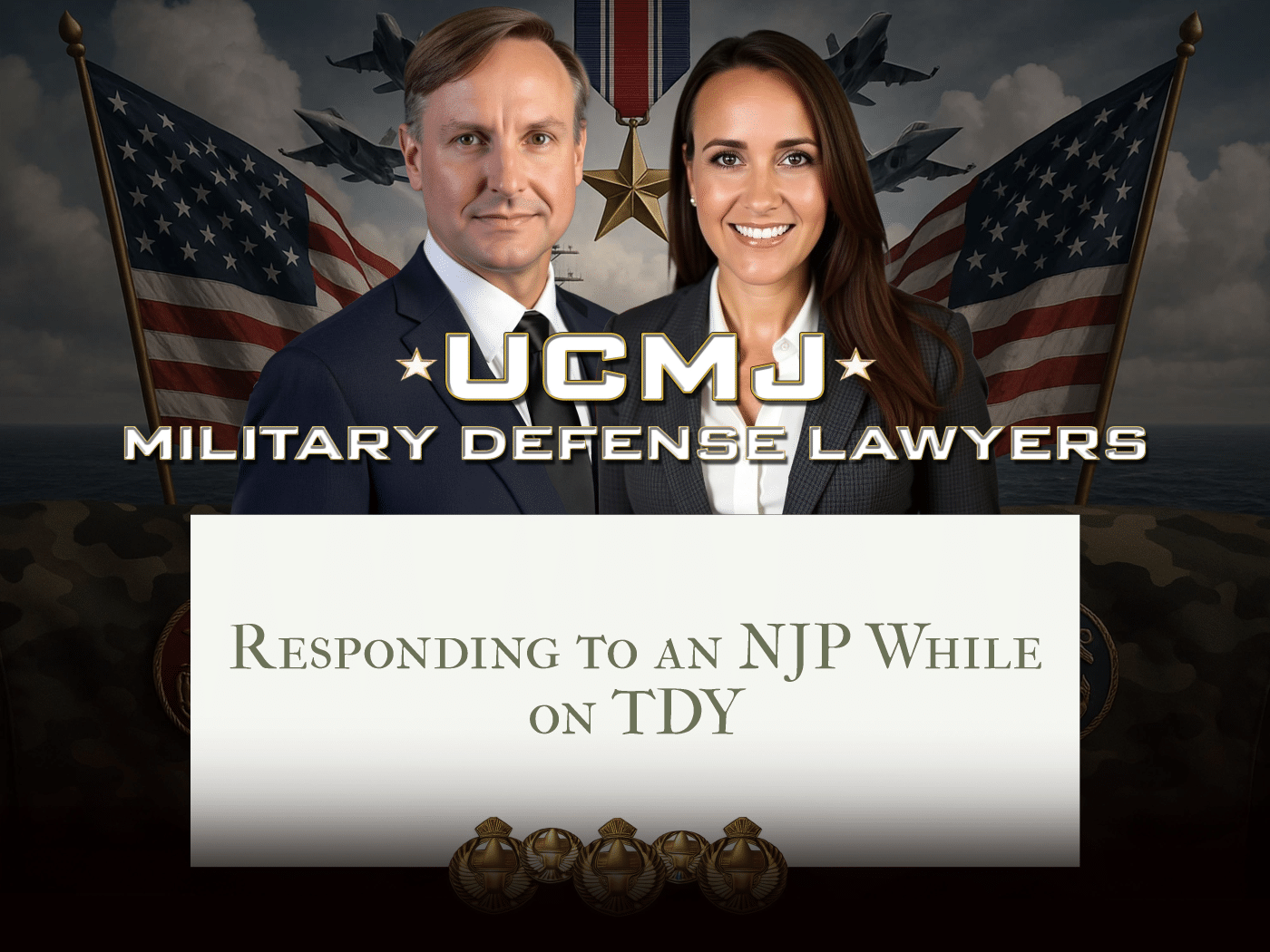Being far from home and facing disciplinary action can be terrifying. If you are on Temporary Duty (TDY) and receive a Non-Judicial Punishment (NJP), it can feel overwhelming and disorienting. Understanding your NJP TDY Response rights and responsibilities is crucial for protecting your career and your future. When servicemembers receive an NJP while on TDY, confusion often arises from not knowing local rules, being separated from direct command, and dealing with unfamiliar authorities. This article will guide you through what an NJP is, how it works when you’re TDY, and the appropriate steps to take. Whether you’re active duty or reserve, being charged with misconduct while away from your home base presents unique legal challenges. The right knowledge and proper legal support can make a significant difference in the outcome. Knowing how to respond can mitigate consequences and help preserve your military record. Let’s break down the NJP TDY Response process and how to best manage it.
Understanding NJP TDY Response and What It Involves
NJP stands for Non-Judicial Punishment, a disciplinary action used by commanding officers to address minor misconduct without a court-martial. While NJP is considered less severe than a court-martial, its implications can still be serious and long-lasting. TDY refers to Temporary Duty, which is when a servicemember is temporarily assigned to a location other than their permanent duty station. The term NJP TDY Response refers to the legal, professional, and personal steps taken by a service member when they face NJP proceedings while assigned to a TDY location.
For example, a soldier attending a training course in another state may be accused of fraternization by a supervisor. Another case may involve a sailor on TDY overseas being charged with disrespect after a misinterpreted interaction. These situations quickly become complex when you’re away from familiar surroundings, leadership, and legal resources. The geographic separation can also make coordination more difficult and raise concerns about fairness, local customs, and unfamiliar command environments. Because of this, knowing how to respond in such circumstances is vital to defending your rights and maintaining your professional standing.
Why Responding Correctly to NJP While on TDY Is Crucial
Responding appropriately to an NJP during TDY matters because missteps can lead to unnecessary career setbacks and even discharge from the military. When a servicemember is TDY, they often face a challenging environment with limited support resources. There may be confusion about whether their home unit or the TDY command will handle the NJP, leading to inconsistent guidance and outcomes. As a result, servicemembers may unknowingly waive important rights or fail to present a proper defense.
Furthermore, a record of NJP, even for relatively minor offenses, can negatively affect a servicemember’s military career, including promotions, deployments, and reenlistments. A poor NJP TDY Response can also impact civilian life after service, especially when seeking jobs requiring security clearances. Understanding the ramifications and planning a well-structured legal response is essential to protecting both present and future opportunities.
- Service member is reprimanded overseas during TDY and accepts NJP without consulting legal counsel, resulting in career-stalling documentation.
- Member is accused of disobeying orders at a temporary training site and waives their rights due to lack of awareness, leading to suspended privileges and poor reviews.
- Misconduct report is initiated while on TDY, but confusion around jurisdiction causes delays, putting the member at risk of harsher penalties and loss of income.
How the NJP TDY Process Typically Unfolds No Matter Where You Are
- Step 1: A report of alleged misconduct is made to the TDY/host command. Investigation may begin, and you are notified of pending allegations.
- Step 2: A decision is made whether to pursue the NJP at the TDY location or defer to your home command. You may be advised to consult with legal counsel.
- Step 3: If NJP proceeds, you will be issued a notice of rights and offered the opportunity to accept or refuse NJP. Refusal usually results in a court-martial.
Top Suggestions for Handling an NJP Received While TDY
Common Concerns and Clarifications About NJP While on TDY
How Gonzalez & Waddington Helps Military Clients Through TDY NJP Cases
At Gonzalez & Waddington, we understand the complexities of facing NJP while away from home, especially during TDY assignments. Our legal team includes military defense attorneys with decades of courtroom and administrative experience in worldwide military law. Whether you are stationed overseas or temporarily relocated within the U.S., we provide strategic, time-sensitive counsel that aligns with your service obligations. Our goal is to protect your rights, advocate for fair outcomes, and offer peace of mind in stressful situations.
We’ve successfully helped hundreds of clients navigate NJP procedures during TDY by highlighting procedural errors, defending against false accusations, and securing favorable resolutions. From advising whether to accept an NJP to preparing robust appeals, our firm ensures client-centered guidance every step of the way. Trust us to be your ally when the stakes are high and clarity is most needed.
Quick Recap of Everything You Need to Know About TDY NJP
.



